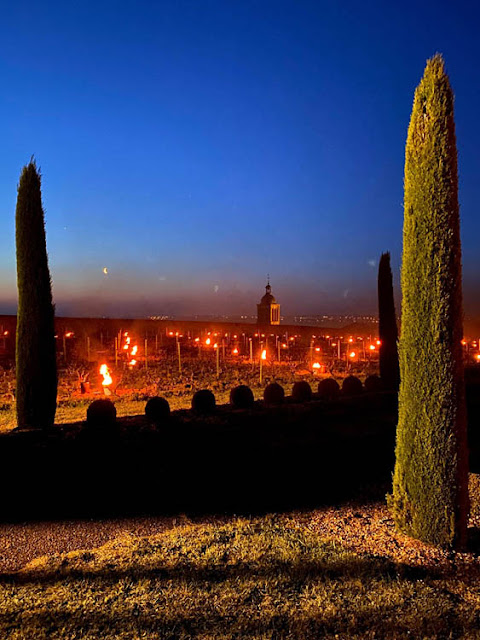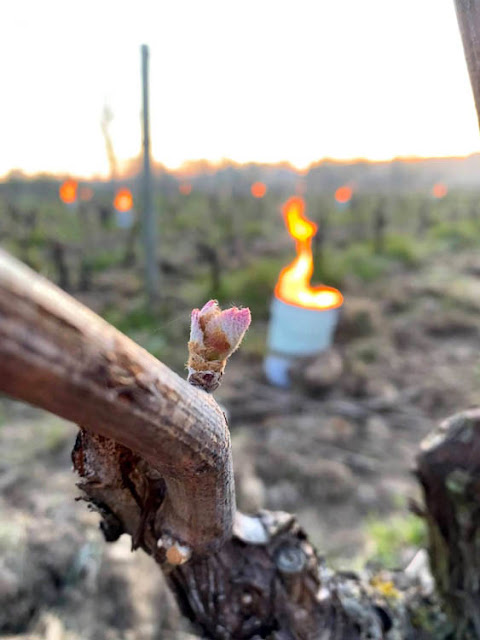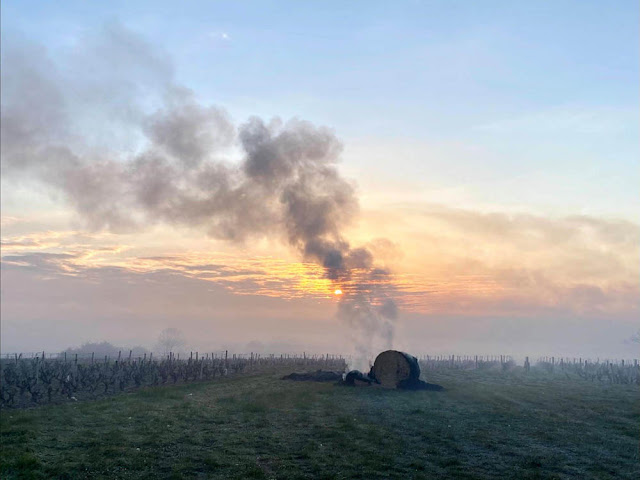 |
My former colleagues happy to hear I brought a thermos of coffee! Photo courtesy of Laetitia Rey.
|
Many of you will have seen in the news the dramatic scenes of winemakers in France desperately trying to save this year's vintage. After some days of unusually warm weather, bud burst was well underway on the vines from Burgundy to Bordeaux, and here in the Touraine Loire Valley. Then the weather changed, with clear sunny days, but minus temperatures over night. This is really bad news for tender young vine leaves as they are likely to burn with the combination of hard frost followed by bright sun. Once the buds are killed the vine will not produce a growing tendril, so it won't flower and with no flowers it can't fruit, so no wine.
 |
An emblematic view over the church tower of Vouvray. Photo courtesy of Laetitia Rey.
|
The wine growers use various strategies to combat frost, but the most common is to set out paraffin candles along the rows and hay bales around the edges. This method is chosen because you don't need permission from the authorities to do it, unlike some other anti-frost techniques. The candles are usually lit very early in the morning and can increase the temperature around the vines by two or three degrees. Sometimes that's all you need, but it is likely that all the effort has not paid off this time. The work is done by hardy volunteers, and is dirty and not very healthy. They get covered in soot, and worse, breath it in. But in desperation even the organic wineries have been using candles. They cost €2000 per hectare, a cost that Touraine wine growers will be reluctant to pass on to their consumers, so must bear the costs themselves. They worry that with diminished supplies of wine and many competitors, if they put their prices up they will lose customers, who will never come back. This time the damage has been so bad that the French government has declared a national agricultural disaster. This will mean that wine growers can benefit from tax breaks, automatic and rapid insurance payouts and low interest government guaranteed loans to tide them over.
 |
Clos le Vigneau, both the name of the plot and the wine produced by Chateau Gaudrelle. Photo courtesy of Laetitia Rey.
|
My friend and colleague, Laetitia Rey, lives in Vouvray, in the midst of the vines, and she is a freelance guide specialising in wine tourism [link]. She was out with much of the community over the very cold nights of April 7 and 8, and has kindly written an eye witness account of the action in the vineyards, illustrated with the dramatic photos she took at the time.
 |
This little guy had survived 2 nights in a row. I hope he made it through the third one. Photo courtesy of Laetitia Rey.
|
As I live in Vouvray (and was out 2 out of the 3 nights), I thought I could share what happened in the vineyard this week.
First you have to understand that frost is a pain, very difficult to predict as it is due to a combination of cold temperatures, humidity and, at sunset, sun exposure. Factors such as air mass and winds are decisive.
Depending on how developped the bud is, it can handle temperatures between -8° and 0° celsius. Unfortunately for us, it has been pretty warm here the past week and the buds broke. It means after a 30-min exposure at 0.6° celsius the bud (and future shoot carrying the fruits) scorched.
Back to Vouvray.
Monday night. First night out for the winemakers. The air is cold and dry. Temperatures drop to -5° abruptly. Those we can't fight (mostly for economic reason) understand spring 2021 is going to be rough.
Tuesday night. My former colleagues in Chateau Gaudrelle receive the first alert from the weather stations dispersed in the vineyard. -2° at only 10.00 pm. By the time they get there, it warmed up a bit. False alarm. Everyone goes back to bed until the second alert. The real one. -3° at 4.00 am. For 4 hours, the temperatures go up and down and finally stabilise at the sunset.
Wednesday night. The cold sets earlier. The fight starts at 2.00 am for most winemakers. Messages from Chinon say they are up to, from midnight for some. This time the humidity rate is high (over 80-85%). It has rained over a few plots in the evening. Without a proper ventilation (helicopter) combined to warm air (from heaters or straw bale), there will be some bad damage, again.
Thursday. The weather forecast says rain and temperatures over 0°celsius for the nights to come. Winegrower will probably stay home tonight. At least in Vouvray. Many have spend the day looking at their vines to count the burnt buds. Though most will wait a few day or even early May to announce the loss.
I had a walk in the vineyard as well. And the first glimpse is devastating..
 |
If you can zoom, we have here an exemple of a mixed end result. Look at the buds form right to left.
The
right cane has 6 buds. The 3 broken bud (and 2 already had shoots
growing) are done. They could only handle temperatures above 0° celsius.
The fourth bud was fully swollen and ready to break. It could resist up
to 30 min at -0,6° celsius but it didn't make it. The fifth is hidden
by the wire. It was just swelling and could survive temperatures above
-2° celsius but scorched. The sixth bud is still dormant and can handle
up to -8° celsius. He is the one surviving over the 6. So only one
fructiferous shoot will grow on this cane. Photo courtesy of Laetitia Rey.
|
 |
The sun slowly warms up the air and the smoke from the candles protects the buds from the burn. Photo courtesy of Laetitia Rey.
|
 |
This is not winter fog but the smoke from frost protection. Hopefully the neighbourhood has been warned. Photo courtesy of Laetitia Rey.
|
 |
I let you imagine the smell on my clothes. Photo courtesy of Laetitia Rey.
|
 |
They made it through the week. Let's hope they won't have to face the cold later in April or May. Photo courtesy of Laetitia Rey.
|
 |
We recognise two sorts of smoke: the black one from the paraffin candles... Photo courtesy of Laetitia Rey.
|
 |
| ... and the white one from the straw bale fires. Photo courtesy of Laetitia Rey. |
|
 |
In the end, here is a broken bud. This one cannot survive below 0° celsius. Yet it is still green and firm when gently pressed. Photo courtesy of Laetitia Rey.
|
 |
On an unprotected plot, a few rows away, there is about 50% of scorched buds. Photo courtesy of Laetitia Rey.
|
 |
Multiple fires in the distance to protect the vineyard from the rising sun. Photo courtesy of Laetitia Rey.
|
And I've just seen that the whole thing will need to be repeated early next week, with another cold snap forecast.
************************************************
For details of our private guided tours of chateaux, gardens, wineries, markets and more please visit the
Loire Valley Time Travel website. We would be delighted to design a tour for you.
We are also on
Instagram, so check us out to see a regularly updated selection of our very best photos.















1 comment:
Fascinating to read these observations by an expert.
Post a Comment